#or even restrain your intelligence development as i did with that friend of mine
Text
....If i were to create a utmv sona (and now i will), then it'll be an Error-Ink fusion cuz fr:
I'm forgetful, short, draw on my hands, can somewhat knit, chocolate is my life, and i swear like a pole
oh ye, and i like scarves
and wear glasses
and am a psycho
maybe
and-
#so a funni story.#basically#when i actually went out to touch the grass and wasnt homeschooled#my bestie asked me to do her eng hw#and help her with... p much everything but a few subjects#which is a hella lot of stuff#but yk#as any smart young influencer i took payment for my services#in other words#holy shit ive never eaten as much chocolate weekly as i did in the 6th grade-#i WILL slay for chocolate#or even restrain your intelligence development as i did with that friend of mine#be me#dont know biology#pretend to know it#and then get tons of free chocolate from TWO whole classmates#good old days...
8 notes
·
View notes
Text
Symbiotic Friends
Joseph Joestar x Symbiote reader
Requested by: anonymous
Could we get more symbiote au pls? I love that Au idea very much! And for a character, could you do Joseph pls? 😳
Symbiote AU
I’m really glad people enjoyed that AU so much! Thank you for the kind words.
This is a little long. Please enjoy.
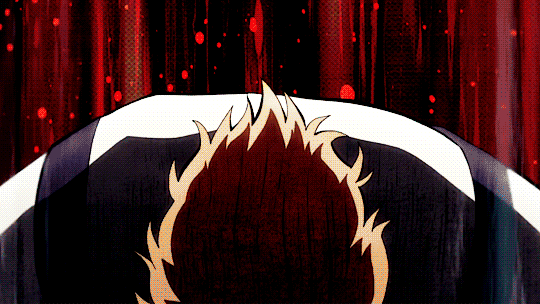
Humans were often intrigued yet fearful of something that they didn’t understand. Something foreign to their knowledge that their minds couldn’t determine was harmless or a threat. For some, it would spark fear to stay away from whatever it was or attempt to remove it entirely. For others, it could be seen as a remarkable discovery, something new for humans to control and dominate.
That was what Rudol Von Strohiem saw when his soldiers discovered the strange organism that had emerged from the meteor that had crashed from the sky. They contained it in a thick glass unit and had it shipped off to their nearest facility for examination, along with the living statue they had found in a concealed tomb and the unconscious but wounded Speedwagon.
Whatever this thing was, it was something that latched onto Strohiem’s curiosity as much as the Pillarman did. A new species of life and he was having the honour of possibly discovering such a thing. Though, every living creature they sent into its container in hopes it would bond with it was denied and killed, resulting in failure after failure. They needed the right one, the right host. Each human sent in was rejected. Still, he continued such experiments, determined to find the right host.
As the experiments continued, the Germans were oblivious to the impostor who had stolen a uniform and had slipped his way into their facility, searching for his uncle. Joseph had no intentions to cause any situations, he wanted to get his uncle and leave, that was all. Though, Fate seemed to have other plans as an array of events led up to a moment that was yet to play out. Such as a scientist stumbling about the halls almost tiredly, his head hanging low as he left the symbiote containment unit. The container empty.
Everyone had gathered around the glass, observing the development of the Pillarman and hoping that they would make some form of progress in finding where the damn thing had gone. Somehow, after it had awoken, he had escaped his chamber. Speedwagon, restrained to a wheelchair in a full body straight-jacket of sorts, was forced to witness all this. Cold fear nipped and brushed him at all of this. Another soldier slipped into the room, as did the sickly looking scientist. There. That one soldier. Something about him appealed to the creature, he was the right one. The perfect host.
As the soldier went over to the prisoner, the scientist seemed to lunge at him, catching everyone’s attention as well as shock of how such a feeble looking man could lift someone twice his size and weight up into the air. The soldier’s hat was knocked down, revealing his face to them. Unrecognisable to the soldiers but immediately to Speedwagon as his heart sunk at the sight of his nephew here.
“Geez, how the Hell are you so bloody strong?!” Joseph shouted, attempting to wriggle his way out of the scientist’s grip. Along the man’s hands, an oily black substance materialised and slithered along from his hands to Joseph’s face.
“Joseph!” Panic laced Speedwagon’s words as he saw this, the shock painting the soldiers’ faces as they stared at this. How did the symbiote get out without an alarm being raised?! The black substance, rather than fading into his skin, seemed to mould around Joseph’s body, much to the shock laced amazement to Strohiem.
“It....it’s accepted him....He’s the right one...”
The scientist dropped to the floor, a lifeless corpse, as the symbiote consumed Joseph’s form despite his frantic attempts to get the substance off him. Its build grew more thanks to the chosen host’s physical body, covering him like a suit until there was no visible sight of Joseph left. His fearful expression consumed by the large, white slates for eyes that held a hunger in them despite the lack of pupils or irises. Its jaws opened almost impossibly wide for anything human, lined with needle teeth fit for a monstrous predator as the tongue swayed lightly, similar to a snake would but not exact.
“JOSEPH! NO!” Speedwagon’s fearful, pained cries bounced off the walls around them, horrified by what had happened to his nephew. The soldiers raised their guns, fear coursing through them at the sight of this monster and waited for their Major to give the command. One, though, shot before the command was given, earning the creature’s attention as it roared and grabbed hold of him, swinging his body into the wall and floor with incredible strength and speed, shattering bones before tossing the body away.
“Now, which one of you were stupid enough to leave me in that container?” The deep, rumbling voice made everyone stand on edge more, Strohiem -trying to conceal his unease- stared at the creature.
“That was me, Major Rudel Von Strohiem.” The symbiote towered over him, a low rumbling erupting from it as it grinned at him.
“You’re certainly a stupid human, toying with things beyond your comprehension.” The thing spoke, showing incredible intelligence and understanding of human speech despite being in their presence for such a limited time.
“And I wish to change that. We wish to learn from you, of you. What you are and what you’re capable of.” Another series of rumbles were made, this time, as if it was chuckling at Strohiem’s answer.
“Like Hell.” It growled before turning away and going towards the doors leading outside. Another soldier shot at the creature before before the bullet even touched its hulking form, the symbiote turned sharply, jaws open wide and latched onto the man’s head; teeth piercing through the flesh, bone and all else, ripping his head from his body and in one or two bites, swallowing it. A handful of horrified cries came from the soldiers before the thing grabbed hold of Speedwagon and broke through the doors of the facility, escaping the place with surprising ease.
After getting away from the facility and someplace more secluded and safer, the symbiote recoiled, reverting back into Joseph and allowing the young Joestar to be seen again, unharmed and himself.
“Oh my God!” Joseph cried out, shock carved into his face at what had just occurred. “I bit that guy’s head off!” Everything that had happened, he had seen and heard. He was thankful that the thing-
“I am not ‘Thing’. I am [Name]!” Joseph jumped at the sudden voice, eyes darting around to find the source of it, his Hamon sparking.
“Wait, you’re that stuff? That black mouldy stuff that guy passed to me?” He questioned aloud, unsure of how to actually speak to it, as well as trying to handle the fact he is infected by something that had just bitten a man’s head off.
“Yes, I am. A symbiote, as what your kind call me. That scientist wasn’t suitable but he served me well enough to find another, better host. And you had happened to have been there, Joseph.” It spoke, the voice sounding around him yet only he heard it as Speedwagon seemed oblivious to the voice.
“Alright....so why’d you pick me? And what do you want?”
“Simple. I chose you because you’re strong and young, a good host for me. And compatible. I am very picky with mine.” [Name] answered, “And I want to survive. Your planet’s atmosphere is absolutely disgusting. All this oxygen and all, bleh!” There was something almost relaxed about how it was talking to him, almost like how one would speak to a friend. Joseph took some steps away from his uncle, rubbing his head as he tried to focus and think things through.
“How about this: I help you and you help me, Joseph?” [Name] suggested, that relaxed tone remaining as it spoke. “You’re a good match for me and if you help me then I’ll have your back.”
“And by ‘helping you’, you mean....?”
“Food. Keep me fed and I’ll help you.” At first, that didn’t sound too bad but it was the concept of food that concerned Joseph.
“Does that mean I have to become a cannibal?” A flash of concern painted Speedwagon’s face at the one side conversation he was hearing.
“No. Not really.” That answer did offer some relief to this situation. Joseph sighed softly and ran a hand through his hair.
“Alright, [Name]. But I have a question.” He said, “....My bike I used to get here is back at the base, how the Hell are we going to get anywhere on foot in this heat?” He asked as he looked around to see a road and desert with literally nothing else.
“Oh, that’s easy.” He could hear the grin in [Name]’s voice as it spoke. This is going to be....different.
#joseph#joseph joestar#jojo bizarre adventure#joseph joestar x reader#jojo bizzare adventure x reader#jojo#jojo x reader#jjba#jojo part 2#jojo battle tendency#battle tendency#battle tendency x reader#symbiote reader#symbiote au
77 notes
·
View notes
Text
for its maker trusts in what has been made, though the product is only an idol that cannot speak
In late April and May, I had some tomatillos from the Port Credit Seed Library growing along side some Chadwick cherry tomato seedlings.
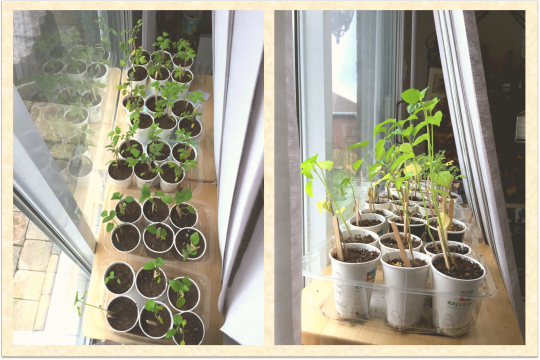
I hope to explore the history of these two plants some time in a post here, because they have a fascinating and somewhat intertwined history, and there’s quite an interesting story of global botanical exchanges behind the tomato itself, something that only arrived in Europe after Spanish colonizers encountered it in Latin America.
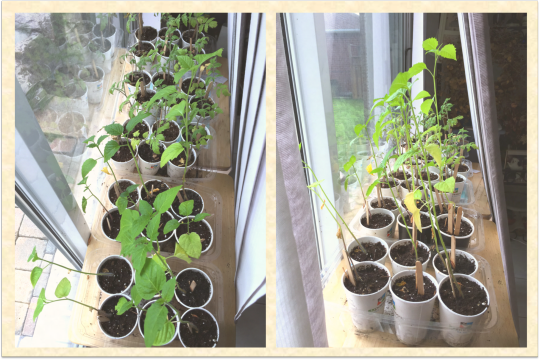
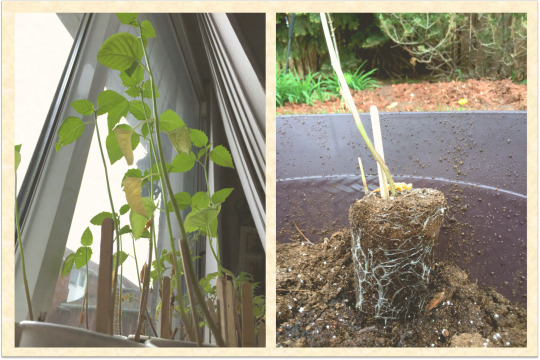
Anyways in May, I transplanted these sprouting friends of mine into an existing bed in my family’s backyard.

Not a proper vegetable bed, and not quite adequately spaced or exposed to sunlight, but hopefully a few of them will survive. I did not read extensively on best practices, nor did I follow the little that I did read, because I’m only borrowing space in a backyard that’s not really my own. Yet it’s not really my parents’ own either, in an important sense.
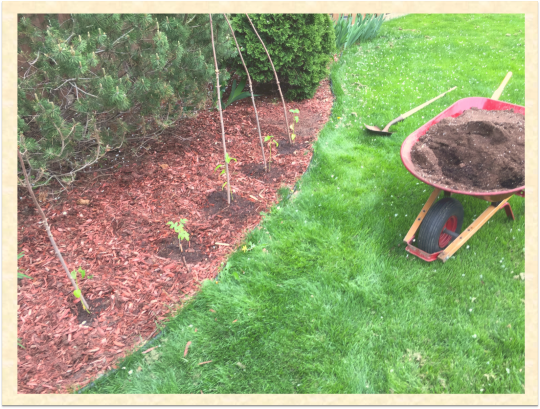
This process of transplanting seedlings into the land last month prompted me to think a little more about the history of this land. I often hear language along the lines of ‘look how far we’ve come’, as people discuss the vanishing of farmland in the areas surrounding my neighbourhood, because there is a very particular idea of progress presumed by most people who live where I live.
Machine as Metaphor
I last discussed on here Terry Eagleton’s suggestion that modernity’s ideology of progress does not know what to do with death, as death does not fit within its linear ‘upward’ narrative. Modernity’s fixation on ‘progress’ however is not only implicated in our collective repression of death, but also in the functioning of power and the way our species (particularly under ideologies like imperialism) asserts power over other species within the ecosystems we inhabit. Modernity is paradoxically emblematic of the sort of perverse romanticism that Haraway brought into doubt when she said the cyborg knows of no Edenic dust to return to. Wendell Berry’s “Unsettling of America” speaks of this attempt of modernity to recover Eden by way of the machine:
“having thus usurped the whole Chain of Being, conceiving itself, in effect, both creature and creator, humanity set itself a goal that in those circumstances was fairly predictable: it would make an Earthly Paradise. This projected Paradise was no longer that of legend: the lost garden… This new Paradise was to be invented and built by human intelligence and industry. And by machines. For the agent of our escape from our place in the order of Creation, and of our godlike ambition to make a Paradise, was the machine-not only as instrument, but even more powerfully as metaphor. Once, the governing human metaphor was pastoral or agricultural, and it clarified, and so preserved in human care, the natural cycles of birth, growth, death, and decay. But modern humanity's governing metaphor is that of the machine. Having placed ourselves in charge of Creation, we began to mechanize both the Creation itself and our conception of it. We began to see the whole Creation merely as raw material, to be transformed by machines into a manufactured Paradise.
And so the machine did away with mystery on the one hand and multiplicity on the other. The Modern World would respect the Creation only insofar as it could be used by humans. Henceforth, by definition, by principle, we would be unable to leave anything as it was. The usable would be used; the useless would be sacrificed in the use of something else. By means of the machine metaphor we have eliminated any fear or awe or reverence or humility or delight or joy that might have restrained us in our use of the world. We have indeed learned to act as if our sovereignty were unlimited and as if our intelligence were equal to the universe.”
Berry’s comments resemble the way Ivan Illich speaks of our addiction to machines and how it harbours within it an old addiction to slavery. Yet I find Berry here most resembling a theme that recurs a lot in various indigenous thought, particularly the intellectual Vine Deloria Jr’s work. Deloria, in a talk on Native American religious freedom said that:
“The vast majority of Indian tribes (and I don’t know off hand of any that would not hold this view), the vast majority knew, saw, felt, and experienced the universe as a living entity.
...And for thousands of years, living in the North American continent, traditional people, medicine people... were able to communicate with other forms of life, whether they were rocks, or trees, or birds, or other kinds of animals. They were able to communicate with areas of the land itself.
…Now our continent was invaded by your ancestors. A lot of them came over here seeking religious freedom, but they also came over here with a European form of the Michelangelo virus. And that was the belief that the universe operated like a machine. And that has proven immensely useful in science, but I’ve seen a great rebellion among the younger generation of scientists, that the analogy of the machine does not adequately describe the physical world. And if you treat the physical world as if it was a machine, from time to time it’s going to break down.”
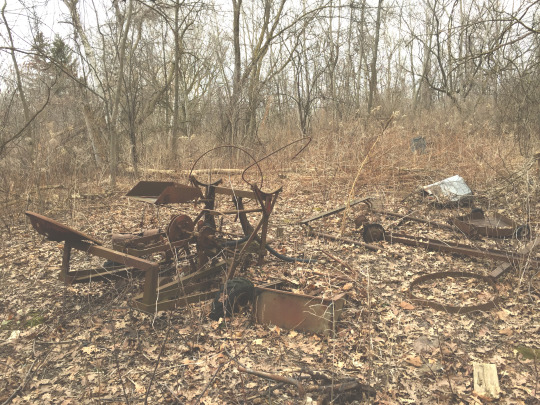
Deloria, in “The Metaphysics of Modern Existence”, quotes Alvin Toffler in order to explain the prevalence of the machine as metaphor:
“we all learn from our environment, scanning it constantly—though perhaps unconsciously— for models to emulate. These models are... are, increasingly, machines. By their presence, we are subtly conditioned to think along certain lines. It has been observed for example, that the clock came along before the Newtonian image of the world as a great clocklike mechanism, a philosophical notion that has had the utmost impact on man’s intellectual development...Then we used the analogy of a clock to prove the presence of an absolute time within the universe, which was conceived to operate in the absolute manner we had been taught to expect.”
Deloria goes on to discuss Paul Tillich’s critique of the machine metaphor:
“Tillich suggested that the “man who transforms the world into a universal machine serving his purposes has to adapt himself to the laws of the machine. The mechanized world of things draws man into itself and makes him a cog, driven by the mechanical necessities of the whole. The personality that deprives nature of its power in order to elevate itself above it becomes a powerless part of its own creation.”
Or, in the words of Karl Barth (from Vol 3, Part 4 of his Church Dogmatics):
“the power that exceeds our real necessities of life, the power of technology — which basically has its own rationale and purpose, and which, in order to survive and be able to improve itself, must call forth ever new problems to solve — this had to become the monster that it largely is today, and ultimately, absurd though it is, it had to become a technology of disruption and destruction.”
So what is the problem that the institutions of power have constructed here in this land I live on now?
The Problem
Machines stand in for modern ideas of progress, because we have too often defined progress as the ability to increasingly instrumentalize the world around us, to increase its productivity according to the exclusive interest of ‘us’ humans, or more accurately humans with the most power in a ‘free’ market economy (i.e. humans with the most money).
The arrogant ideology of modernization is the same one that the indigenous intellectual Taiaiake Alfred references in his work. He believes Canada’s government policy regarding indigenous issues is perpetually misframed as a solution to a particular ‘problem’, that ‘problem’ being the lack of economic development in indigenous communities – a failure on the part of these communities to adequately ‘keep up’ with modern progress or to accommodate the liberal democratic state. This has historically been called the ‘Indian problem’.
An example: Duncan Campbell Scott was a bureaucrat in the Department of Indian Affairs for two decades (1913 to 1932), while also maintaining a reputable literary stature. Northrop Frye once wrote glowingly of Scott’s ability to write on subjects ranging from “a starving squaw baiting a fish-hook with her own flesh” to “the music of Debussy”. Frye, however, never mentioned how Scott, in many ways, perpetuated the ‘cultural genocide’ of indigenous communities. Scott once wrote:
“I want to get rid of the Indian Problem. I do not think as a matter of fact, that the country ought to continuously protect a class of people who are able to stand alone… Our objective is to continue until there is not a single Indian in Canada that has not been absorbed into the body politic and there is no Indian question, and no Indian Department, that is the whole object of this Bill.”
This aggressive integrationist model is behind all government policy that locates the problem of indigenous issues as one of ‘development’. This is a way the Canadian nation-state has acted as if it were God, and to make indigenous nations into its own image: ‘modernized’ and ‘developed’.
Taiaiake Alfred instead insists that Rosalee Tizya was right when she said the main issue and root problem is and has always been that indigenous land was stolen. The issue is not economic development nor even access to institutional state power. It was and is dispossession.
People Who Dwell at The Mouth of a Large River
Planting vegetables this summer, I am unavoidably planting vegetables on stolen land. Not only stolen, but also utterly ruined. The destruction of this land and its intricate ecological systems of interdependence was vital to its theft.
The the Anishinaabe academic, artist, and activist Leanne Simpson posed this question: “Why did my ancestors sign treaties after we lost the political power to have agency? They signed them because they were starving and they wanted me at the very least to be alive.”
Poverty in indigenous communities at the time of ‘treaty signing’ was not so much an issue of development, as much as it was about a tapestry of ecological connections that were torn apart, and a bounty of food that consequently disappeared. Survival and hunger (from a land stolen and destroyed) was the context of coercion that those treaties emerged from.
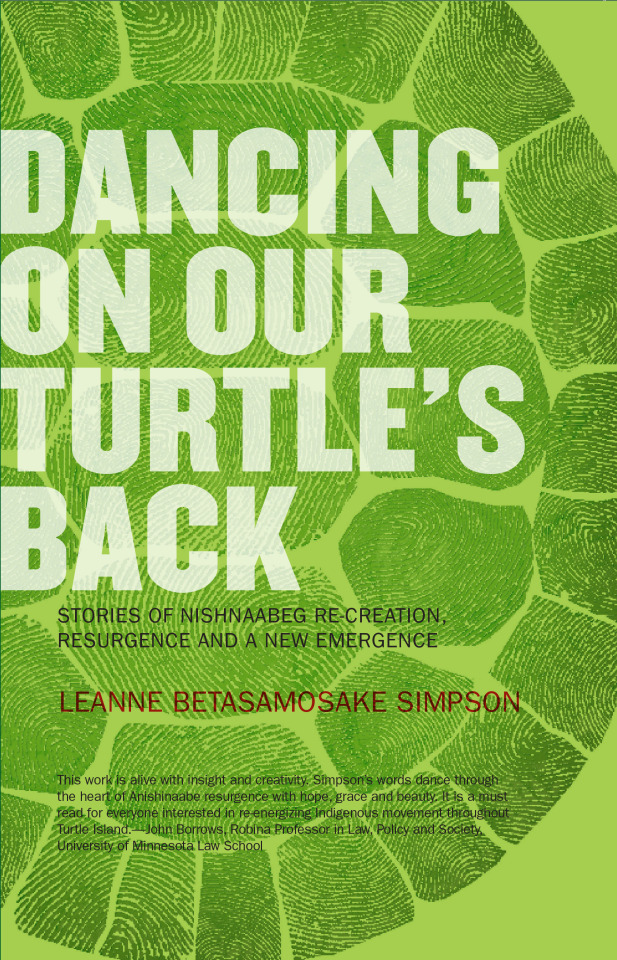
One of the most important food resources that disappeared in the 19th century was the abundance of salmon that once populated the area. In a footnote in “Dancing on our Turtle’s Back”, Leanne Simpson explains Mississauga’s etymology in this way:
“Michi Saagiig Nishnaabeg means the Nishnaabeg people who live or dwell at the mouth of a large river. Michi Saagiig Nishnaabeg Elder Doug Williams explained to me that this is the way his Elders referred to themselves. Peterborough, ON, October 26, 2010. This is similar to Basil Johnston's Mizhi-zaugeek, Anishinaubae Thesaurus, Michigan State University Press, East Lansing, MI, 2006, 14. Michi Saagiig or "Mizhi-zaugeek" people live at the eastern doorway of the Nishnaabeg nation, located in what is now known as eastern Ontario. According to Doug Williams, the word "Mississauga" is an anglicized version of Michi Saagiig or Mizhi-zaugeek.”
Leanne Simpson has also said that her people, the Michi Saagig, were salmon people. That was what they survived on. People have relied on the fish of the Missinihe river long before White settlers arrived. One of the most significant ‘pre-contact’ archaeological sites found in Mississauga (often called the Scott O’Brien site) is located around where the QEW highway intersects with the Missinihe (Credit River). The photo below (from “Mississauga: The First 10,0000 Years”) is a small sample of the 124 notched stone netsinkers found at the site, once used to catch fish in the Missinihe, back when the native species of salmon abundantly populated the river.

These netsinkers were found in two different caches on the site, one of them dating to the Middle Woodland period (~400 BCE to ~900 CE), conservatively over a thousand years old. People have evidently relied on the fish in the Missinihe for a long time, and within a century or two, these fish completely disappeared from the river.
What happened to the salmon? How did ‘the machine as metaphor’ shape the way 19th century White settlers treated the Missinihe river? And for what purposes and to what ends did they do so? Was it ‘worth it’? I hope to examine some of these questions in my next post here.
0 notes